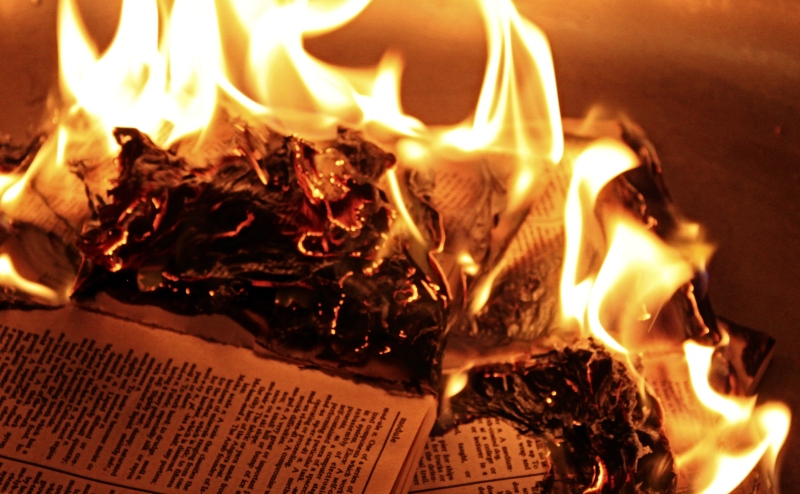by Fred Laceda
 Religion and politics’ connection is interesting, at times odd, and often times explosive. One contemporary depiction of this relationship is between Stannis and Melisandre in The Game of Thrones. The former’s political ambition is bolstered by the latter’s religious idea that Stannis was the chosen one. Politics and religion, in other words, has an intimate relationship. The offspring of such intimacy is hoped to be a blessing, but Melisandre and Stannis’ offspring offers a cautionary tale: Melisandre bore a shadowy, perhaps cursed, child.
Religion and politics’ connection is interesting, at times odd, and often times explosive. One contemporary depiction of this relationship is between Stannis and Melisandre in The Game of Thrones. The former’s political ambition is bolstered by the latter’s religious idea that Stannis was the chosen one. Politics and religion, in other words, has an intimate relationship. The offspring of such intimacy is hoped to be a blessing, but Melisandre and Stannis’ offspring offers a cautionary tale: Melisandre bore a shadowy, perhaps cursed, child.
In the Christian context, for instance, the interface between religion and politics produced an interesting union. A watershed in this unholy alliance is one between the Church and an Empire in decline. The Church adapted the mechanism of control of the Empire; and use authority and power that can be called as “coercive.” This religious/political complex otherwise known as Christendom remained for over a millennia. This arrangement would give way to another instance in the entanglement between politics and religion: the emergence of modernity. The configuration of the various spheres in the modern period radically altered the intersections between politics and religion. By creating a separate, secular sphere—religion become its ‘other’. Religion quickly shoved to the newly created “private” sphere. This exile restricts religion’s participation in the secular public life. Yet Carl Schmitt offers an interesting genesis of modern politics and its inherent and generative connection with religion by saying that—“All significant concepts of the modern theory of the state are secularized theological concepts…”
Moreover, there is another way by which religion and politics conspire. The contemporary scene in Philippine society is fertile for analysis of the religion-politics matrix. Religion figures prominently in the current political scene. Whether supplying “biblical text” for certain laws (e.g., death penalty) or religious concepts such as “forgiveness” for a past wound that still haunts the present (Martial law). In these examples the role of religion is quite interesting. Religion provides a justification or legitimation for a certain political ideology/practice. In what follows I argue that Religion is being used as a weapon of politics. It operates by using religious-theological ideas to reinforce a socio-political injustice.
Take for example the use of “forgiveness” in our current religious-political discourse. One may argue that “forgiveness” is the most abused concept of the day. All social and political ills are seen through the prism of forgiveness. Abuse of power? Killings of the poor? Bleed our coffers dry? All are consigned to forgiveness. What’s interesting, though, is that even so-called “theologians” are harping on such use of forgiveness. Forgiveness does not just offer religious redemption it also now is seen as a panacea for political ills.
But how can forgiveness reinforce a certain injustice? The utterance of forgiveness shuts the door for an appeal because we are forced to forgive at all cost. The problem with this is that it views forgiveness in a vacuum. Forgiveness presupposes that something wrong was done, which include a perpetrator and a victim. It includes, in other words, a social context. It includes a social structure where forgiveness and justice are both in existence. And we know that the relationship of justice and forgiveness are complex and complicated as attested by the latest work of Martha Nussbaum. Thus one is forced to be sensitive by the timing when forgiveness is being given. Forgiveness is abused when it is use to absolve the perpetrator and aggravate the agony of the victim.
Lastly there are those who argue that their view and use of religious concepts such as forgiveness are legitimate religio-political position. They argue that we should go beyond our differences in positions about such matters so that we can preserve unity. This is an ingenious way of saying that we can support such killings but we should not be liable for our views because we as persons are different from our positions. It hides from a misuse of postmodernity’s idea of “relative.” Again, this is one way where religious idea becomes complicit with a certain socio-political abuse. Of course in trivial matters we can in fact say that we allow a diversity of opinions. But in such cases involving the killings of human life, we cannot just consign it to a diversity of opinions. Unless we view life as utterly trivial. This view also hides the ethical implications of our positions. When it involves killing those from the margins there is no neutral ground. Our position either condemn the killings or it incites and encourages it. Discourse and words can reconfigure reality or it can reinforce injustice because discourse is performative thus it translates to a practice.
